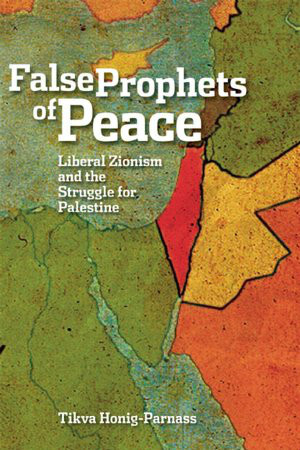The Electronic Intifada 2 March 2012

Anti-Zionist scholar, writer and longtime activist Tikva Honig-Parnass’s new book False Prophets of Peace: Liberal Zionism and the Struggle for Palestine critically analyzes Israel’s left.
Often called Labor Zionism or left Zionism, liberal Zionism is a concept applying to the Labor and Meretz parties, the Histradrut trade union, the Peace Now and Gush Shalom organizations, and the intellectual and activist communities comprising their bases. Honig-Parnass’s track record as a long-standing anti-occupation activist within Israel leaves her ideally placed to deconstruct the liberal Zionist ideology.
Honig-Parnass “aims to refute the prevailing myths among progressive circles in the West about the Zionist left in Israel” (1). She notes that “Western progressives believe that the Zionist left genuinely supports a just solution to the ‘conflict’ between Israel and Palestine, as embodied in the peace initiatives brought forth by Labor governments and Zionist Left leaders” (1). This paradigm paints Palestinians as the main obstacle to peace, rather than Israeli policy. False Prophets aspires to be a much needed corrective and Honig-Parnass dissects Liberal Zionism’s political, intellectual and activist bases to achieve this.
Key to apartheid
It is with its complementary critiques of demography and democracy that False Prophets succeeds best. Honig-Parnass shows how the discourse of keeping a Jewish majority is key to Israeli apartheid. She notes that the “argument for a Jewish majority is based on a simplified idea of democracy: sanctification of the decisions and interests of the majority — which are then foisted upon ‘the people’” (42). “The supreme value attributed to the majority — which just happens to be Jewish — allows Zionist intellectuals to take a hypocritical stance, preserving their image as democrats” by attributing oppressive policies not to flaws in Israeli democracy, but instead to democracy’s successful application (42).
She cites numerous liberal intellectuals from former Knesset member and negotiator Yossi Beilin to Sami Michael — the current president of the Association for Civil Rights in Israel — to illustrate how Israel’s political structure is premised first upon a substantial Jewish majority and only secondarily on democratic political processes.
Beilin notes that Israel “does not interest [him]” without a Jewish majority and Michael would rather leave the region entirely than be a minority among Palestinians (42). The bald racism in the discussion about Israeli demographics is most apparent when couched in the language of restricting Palestinian population growth. Just as importantly, Honig-Parnass questions this using Palestinian sources. One key question that she addresses — “a Jewish majority with regards to whom?” — was originally asked by Hassan Jabarin, founder of Adalah, a group campaigning for the rights of Palestinians with Israeli citizenship (36).
Most Western critics of Israeli policies invoke Jewish Israeli sources to “legitimate” their criticisms for Western audiences. When we cite them specifically as Israelis we allow Western audiences to avoid confrontation from a Palestinian voice, instead keeping the conversation among nice white people. Honig-Parnass does not cooperate with racism and her principled decision of supporting a Palestinian voice is no small thing. It is so obviously the proper way of doing things that I hesitate to commend it, but it is so rare that Western activists and intellectuals support a Palestinian voice that it must be pointed out.
Exceptional analysis, but poorly edited
Honig-Parnass refers to the occupied West Bank and Gaza as “’67 occupied territories” throughout the book. Perhaps she does not wish to cooperate with the hegemonic myth of a qualitative difference between the lands colonized by Israel before and after the 1967 war. But when using different terminology than virtually all other literature one needs to question why. It confuses readers somewhat familiar with the subject and makes unfamiliar readers — Honig-Parnass’s explicitly targeted audience — less empowered to continue their investigations.
It must be pointed out that False Prophets suffers from poor editing. Honig-Parnass also sometimes leaves her impassioned critique aside to become preachy and even condescending. Other faults include her (occasionally) rigid Marxist analysis, and a couple of insufficiently substantiated claims like the purpose of Israel’s wall and military checkpoints in the West Bank is “to create a collaborationist Palestinian Authority” (40).
These faults make it difficult to unreservedly recommend this title to Palestine solidarity activists or scholars, when the subject matter and Honig-Parnass’ exceptional analysis should have made this a go-to book.
Jimmy Johnson is the founder of Neged Neshek, a website focused on Israel’s weapons industry, and can be reached at jimmy [at] negedneshek [dot] org.






Comments
Profit
Permalink George Ronald Adkisson replied on
Any government, that profits war wants the repeated event...to stimulate it's economy.That's the result of George Bush senior's earliest plan for a one world government.
Even Balaam could not be convinced by Balak to profit war..but today's commercialized religions have...even with their labor.
Everyone have an inspirational day.
Iranian Execution of Christian Pastor
Permalink Joe DesBarres replied on
What are your comments on the morality of the Theocratic regime in Iran executing a pastor for his faith?
Pretty sad commentary on a supposedly moral regime. Not moral at all! Merely the bully of the Middle East. Iran has lost its right to command morality from any other country!
Morality
Permalink emwatcher replied on
Hey, Joe -- what are your comments on the morality of the Jewish regime that is almost certainly behind a recent spate of assassinations in Iran? If Iran is a schoolyard bully, Israel is a crazed hulk -- stealing land, lashing out at perceived enemies, and threatening nuclear war.